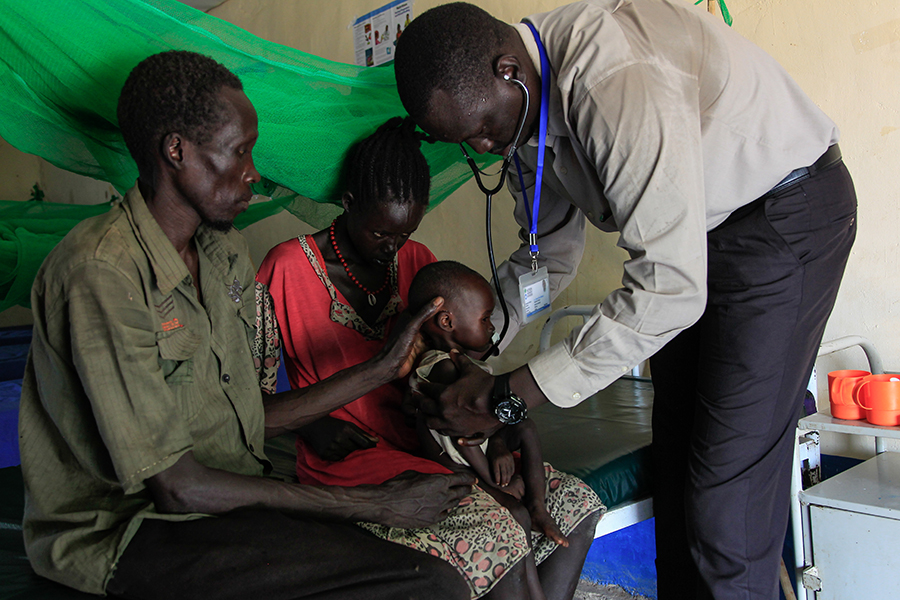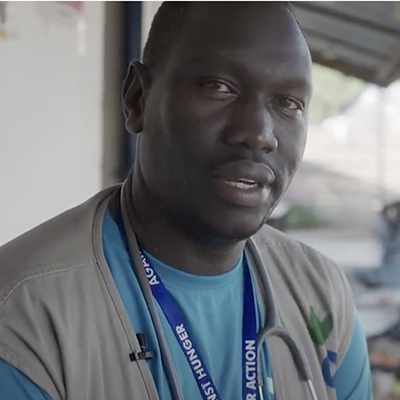I am a medical doctor in South Sudan. I was fortunate to grow up in a family where I had all of my needs met. But when I went out to play, I could hear other children talking about how they had nothing to eat. Some of them couldn’t go to school because their parents could not afford it. I decided that if I made it to adulthood, I would invest all of my time and energy into helping other people.
In South Sudan, doctors are like soldiers. When the war comes, you cannot run away. It’s our job to assure people that we will overcome this situation. Inside, however, I know things could get very bad. I don’t expect help from the outside, as everyone is experiencing their own hardship. But help is needed. Together or alone, like all of the challenges that have come before, I will face this disease, and I will not show my fear. It is my fight, and it is my duty.
Life here is tough. Nearly four million people have been displaced due to conflict, and half of the population faces acute food shortages. There is only one doctor for every 65,000 people, versus nearly 20 times this amount in the U.S. The people we treat are among the most vulnerable on the planet.
My team and I see more than 150 children and pregnant women each day, working to prevent deaths from malnutrition, malaria, respiratory infections, and other hazards. Sometimes families walk all day in the heat through dusty deserts and dense forest, hoping to make it to our stabilization centers while their child still has life. I have saved many children. Often, what they need costs very little. My heart is broken by the many I could not save because they reached us too late. There are days of hope and days of despair.
Enter COVID-19.
So far, four people in South Sudan have tested positive, but we suspect there are many more. I have worked with the government on a response plan, with multiple levels of action. But there is our plan, and then there’s what’s feasible. With only a handful of ventilators for a population of 12 million, fear is mounting.
The UN Commission recently warned that the people of South Sudan are at higher risk than ever. I Agree.
We see how this pandemic has hit countries like Italy, Spain, and the United States, that already had well-established health systems. Everyone around the world is experiencing the same public health threat, but some are more prepared than others.

If COVID-19 spreads to South Sudan, we predict a crisis that could push us to the brink. An outbreak will be extremely challenging to contain. My country is not ready. Prevention is our only hope.
We have expanded our hygiene and sanitation programs to educate more people about the importance of handwashing. We require patients to stay two meters apart as they wait for doctors, and we have separated sick beds as much as possible in what space we have. We set up isolation rooms in our health centers for our workers who may be exposed. We are training our staff on how to stay safe while continuing to treat the communities that rely on us for their survival.
When people come to our facilities, we are confident in our systems of disease prevention. But when they go back home, it’s out of our control. Social distancing will be impossible. Many who have been uprooted by conflict still live in tents only inches apart. Extended families often live together — sometimes in one room — and the bond is powerful. The level of poverty is high. Everyone depends on each other.
Our culture calls on us to gather together in times of hardship. I can’t imagine a situation in which a sick family member, especially a child or an elder, is left by themselves. It’s not in our nature to abandon relatives in times of need, even if it is potentially dangerous for the caretaker. This is our love for each other, and this deeply-embedded, generations-old behavior does not change overnight.
I have many relatives living in my home right now. They were caught in the capital when the shut-down came, and of course, I opened my doors. I have the luxury of multiple rooms so that we can isolate someone if they get sick. Most people don’t. People are terrified to visit hospitals, so they come to my house seeking medical advice. I cannot turn them away. I will continue to confront this pandemic with the mental strength that is required in these trying times. For myself, and for those who need me.




































